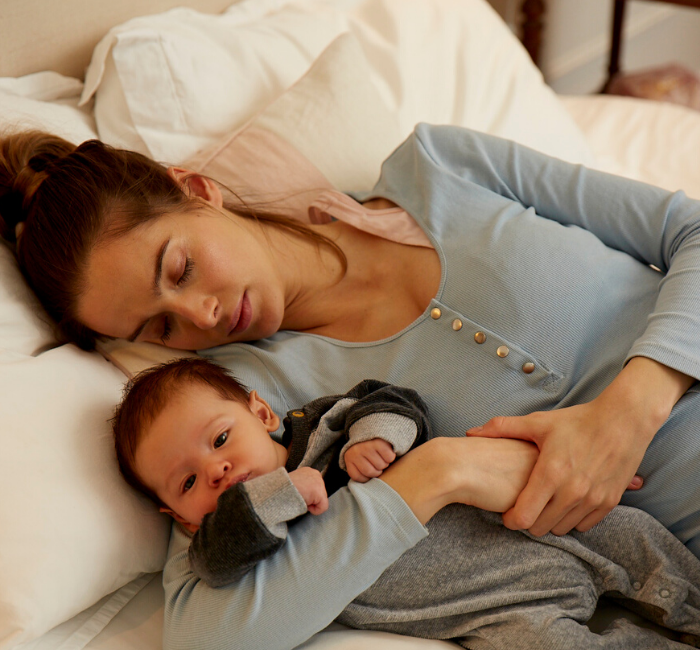Foods to Help with Sleep Deprivation

Sleep is vital for physical and mental wellbeing, and it is often elusive for pregnant or new mums when sleep can be disrupted for a variety of reasons. Insufficient sleep can affect how your brain functions and increases your sensitivity to pain and hunger. Latest research also shows that sleep deprivation can impact immune system health and increases susceptibility to infection.
Whilst a certain amount of sleep disruption is to be expected with a new baby, taking care with what you eat can support the amount of good quality sleep you get when you arrive in bed.
The Importance of Melatonin
Melatonin is a natural hormone which regulates your biological clock (circadian rhythms) and simultaneously improves sleep quality. Our bodies release 10 times more melatonin at night in order to help us sleep.
Your body makes Melatonin by converting amino acids (the building blocks of protein). The process begins by converting tryptophan into serotonin (an important chemical for happiness and wellbeing), and then melatonin. Tryptophan is an essential amino acid which means it cannot be produced by the body on its own, but must be obtained from the food that you eat. Eating good quality protein can help to ensure that you have optimum melatonin levels – but it’s also important to include carbohydrates in your meals too, as these make tryptophan more available to the brain.
Protein Power
Foods rich in tryptophan include turkey and other poultry, meat, cheese, yoghurt, fish, and eggs. Vegan sources of tryptophan include seaweed, soy, spinach, pumpkin and sunflower seeds, almonds, dates and legumes.
Eat Low Glycaemic Index Foods
Low glycaemic foods such as vegetables, beans and whole grains release a slow, steady stream of carbohydrate that helps tryptophan enter the brain. Your body then quickly uses tryptophan to make serotonin, a neurotransmitter that helps with sleepiness and mood.
Eat More Fish and Vitamin B6
Most fish, especially salmon, halibut and tuna, are packed with vitamin B6, which is needed to convert serotonin into melatonin. If you don’t eat fish, you can get vitamin B6 from bananas, quinoa, squash, hazelnuts, chestnuts, sesame seeds and chickpeas. A lack of vitamin B6 has been linked with lowered serotonin levels and poor sleep, so getting enough of this vitamin might help you sleep better.
Eat More Whole Grains and Magnesium Rich Foods
Bulgur and barley are both rich in magnesium which is known as the relaxation mineral. A number of small studies have found that magnesium can have a positive effect on sleep. Dark leafy greens, nuts, brown rice, fish and dairy foods are also good sources of magnesium.
Eat More Calcium-Rich Foods
Pregnant women and new mothers need plenty of calcium rich foods which include green leafy vegetables and dairy foods. As well as supporting bone health, there’s some evidence that calcium can benefit sleep.
Eat More Melatonin Rich Foods
Some foods are rich in natural melatonin including tart cherries and tart cherry juice. Other foods that contain melatonin include corn, asparagus, tomatoes, pomegranates, olives, grapes, broccoli, cucumber.
However, the thing which has the biggest effect on your melatonin levels is light and dark exposure – so one thing which can really help with encouraging sleep is dimming the lights and avoiding screens with bright lights in the hour before bed.
It is also advisable to avoid certain foods and habits if you’re having trouble sleeping.
Caffeine
Caffeine is great for a pick-me-up, but consumed too close to bed can keep you awake and increase sleep latency (the amount of time it takes you to fall asleep). To avoid lying awake, it’s smart to cut out caffeine after 2pm. Bear in mind that even small amounts can have an effect – 25g of dark chocolate has 25 mg of caffeine which is about the same as a quarter of a cup of coffee.
Sugary Foods and Sleep
There’s a small amount of evidence that eating more of your calories from sugar can disrupt sleep. In one study from 2016, adults who consumed the highest levels of sugar had less deep sleep and woke more often than those who had lower intakes. Eating sugary treats before bed may leave you restless, so try to limit these, and if you need a pre-bed snack, opt for a small bowl of wholegrain cereal and milk.
Foods Containing Tyramine
Tyramine is an amino acid and a brain stimulant. Foods such as pork, cheese, chocolate, aubergines, soy sauce, tomatoes, potatoes and wine are rich in this amino acid so they may be worth avoiding in the evening if you are not sleeping well.
Rich Meals
Eating large rich meals late in the evening may also cause problems sleeping. Large high fat meals take longer to empty from the stomach, and the pressure from a full stomach can trigger heartburn. A high fat diet also impacts the production of orexin, one of the neurotransmitters that helps regulate your sleep cycle. Try to allow a few hours between your last meal and heading to bed to avoid any sleep disruption.

